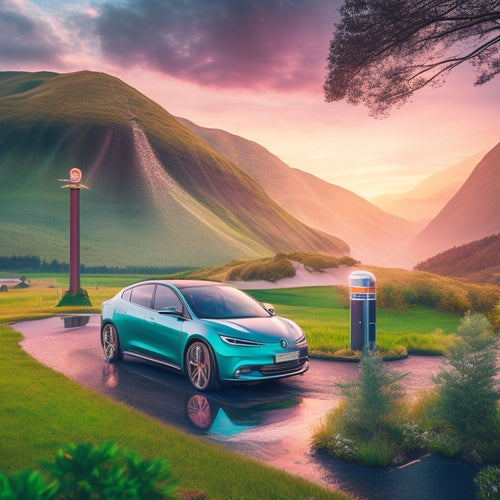
Exciting Debut: Electric Car Revolutionizes Transportation
Share
Electric vehicles have surpassed traditional internal combustion engine cars in sales, marking a transformative shift in the automotive industry. Sustainable innovation drives change, as high-performance EVs with impressive ranges become the new norm. With zero tailpipe emissions, minimal air pollution, and lower operating costs, EVs offer an attractive option for eco-conscious consumers. The projected 70% reduction in greenhouse gas emissions by 2030 signals a cleaner, quieter future. As the industry continues to evolve, the possibilities for a sustainable future are vast, and the electric dream is only just beginning to take shape.
Key Takeaways
• Electric vehicles offer a cleaner, quieter, and more sustainable driving experience, reducing environmental impact and appealing to eco-conscious consumers.
• The EV industry is surpassing ICE vehicles in sales, driving a transformative shift in the automotive sector towards sustainable innovation.
• Electric cars produce zero tailpipe emissions, minimizing air pollution and providing a cost-effective choice for drivers with lower operating costs.
• The widespread adoption of EVs is projected to reduce greenhouse gas emissions by 70% by 2030, leading to cleaner air and a healthier planet.
• As the electric dream continues, vast possibilities emerge for a sustainable future, with electric vehicles only beginning to take shape and transform transportation.
Electric Dreams Take to the Road
As the transportation sector continues to evolve, electric vehicles have emerged as a viable alternative to traditional gas-powered cars, promising a cleaner, quieter, and more sustainable driving experience. The innovative technology behind electric vehicles has greatly reduced their environmental impact, making them an attractive option for eco-conscious consumers.
With zero tailpipe emissions, electric vehicles produce minimal air pollution, contributing to a healthier environment. Moreover, their energy efficiency and lower operating costs make them a cost-effective choice for drivers.
As the demand for sustainable transportation solutions grows, electric vehicles are poised to revolutionize the way we travel, providing a cleaner, quieter, and more sustainable driving experience for generations to come.
Revolutionizing the Automotive Industry
With the electric vehicle (EV) industry poised to surpass traditional internal combustion engine (ICE) vehicles in sales by the mid-2020s, the automotive sector is on the cusp of a transformative shift. This seismic change is driven by sustainable innovation, as EVs offer a more environmentally friendly alternative to traditional vehicles.
Futuristic technology has enabled the development of high-performance EVs, boasting impressive ranges and rapid charging capabilities. As the industry evolves, manufacturers are investing heavily in research and development, accelerating the adoption of EVs.
This revolution will not only transform the automotive industry but also have a profound impact on the environment, paving the way for a more sustainable future.
A Sustainable Future Unfolds
By 2030, the widespread adoption of electric vehicles is projected to reduce greenhouse gas emissions by up to 70%, greatly mitigating the environmental impact of the transportation sector. This significant reduction will pave the way for a sustainable future, where the air is cleaner, and the planet is healthier.
-
Cities with minimal air pollution, where children can breathe freely
-
Green spaces flourishing, as toxic emissions decrease
-
Electric vehicles humming silently, replacing noisy gas-guzzlers
-
Renewable energy sources powering homes, reducing reliance on fossil fuels
-
A healthier planet, where sustainable innovation thrives
As the world shifts towards electric vehicles, the environmental impact of the transportation sector will drastically decrease, paving the way for a sustainable future.
Frequently Asked Questions
How Does the Electric Car's Battery Life Impact Daily Driving Habits?
The electric car's battery life greatly impacts daily driving habits, inducing range anxiety and necessitating a deliberate charging routine, as drivers must strategically plan trips and recharge stops to guarantee uninterrupted mobility.
Are Electric Cars More Expensive to Maintain Than Traditional Vehicles?
Did you know that electric vehicles (EVs) require 30% fewer maintenance visits than traditional vehicles? A cost analysis reveals that EVs have lower maintenance costs due to fewer moving parts, reducing the need for frequent maintenance schedules, resulting in significant cost savings.
Can Electric Cars Be Charged Using Solar or Renewable Energy Sources?
Electric vehicles can be charged using solar or renewable energy sources, leveraging the Renewable Grid to facilitate Energy Harvesting, thereby reducing carbon footprint and promoting sustainable transportation solutions.
How Does the Electric Car's Performance Compare to Traditional Gas-Powered Cars?
'In the domain of racing dynamics, electric cars release their power, rivaling speed demons with swift acceleration and silent precision, outpacing traditional gas-powered cars in a thrilling display of torque and agility.'
Are There Any Government Incentives for Purchasing an Electric Vehicle?
Government incentives for electric vehicle purchases include Federal Tax Credits of up to $7,500, state-specific rebates, and additional benefits, such as access to high-occupancy vehicle lanes, offering consumers significant savings and perks.
Related Posts
-

3 Sun-Powered Automated Shades for Energy-Savvy Homes
You're looking to change your home into an energy-savvy haven, and sun-powered automated shades are an essential step...
-

Why Transform Human Waste Into Garden Gold?
By changing human waste into garden gold, you'll reduce waste management costs, support sustainable agriculture, and ...
-

5 Ways Geothermal Power Boosts Electric Vehicle Efficiency
You're likely unaware that geothermal power can greatly enhance your electric vehicle's (EV's) performance, range, an...


